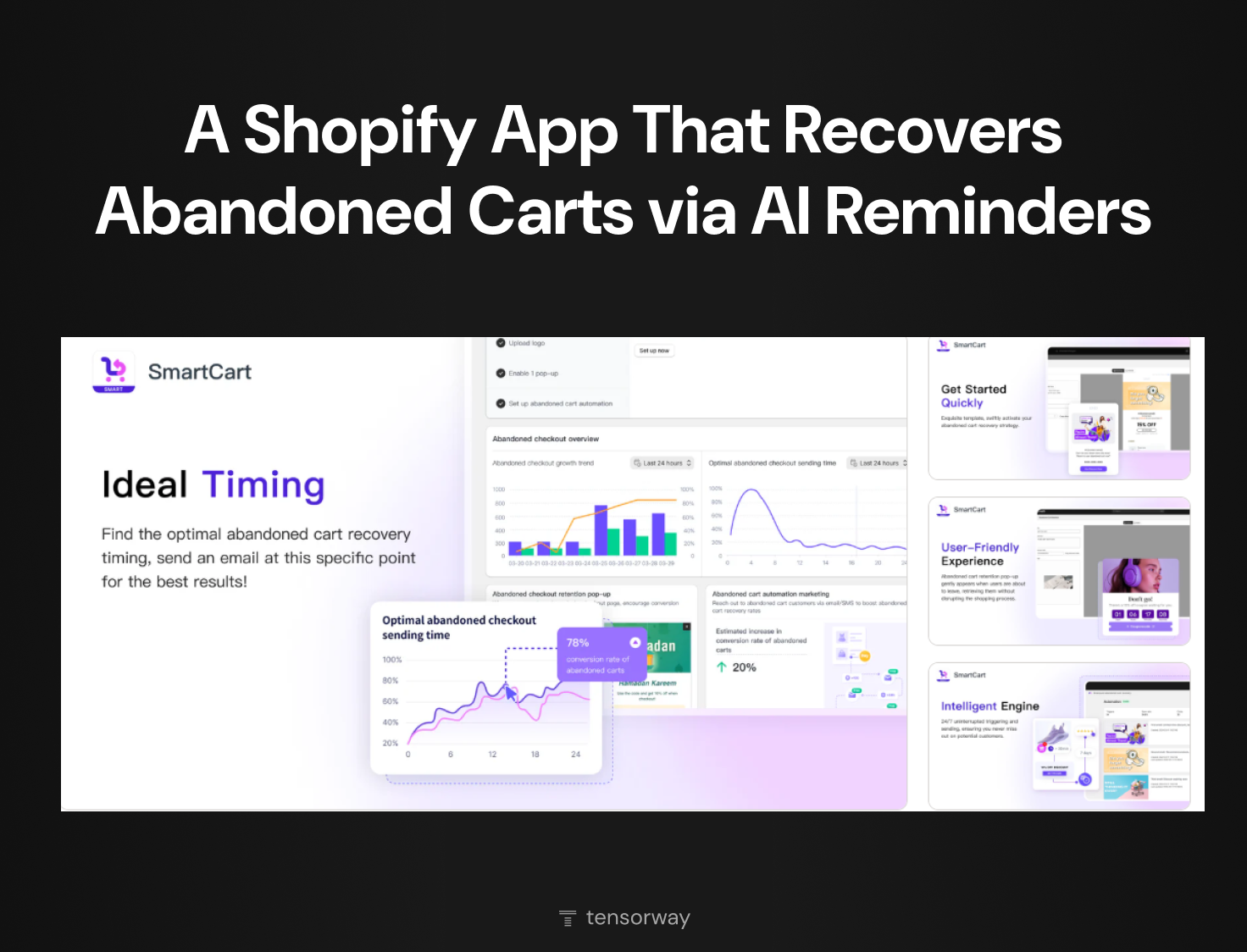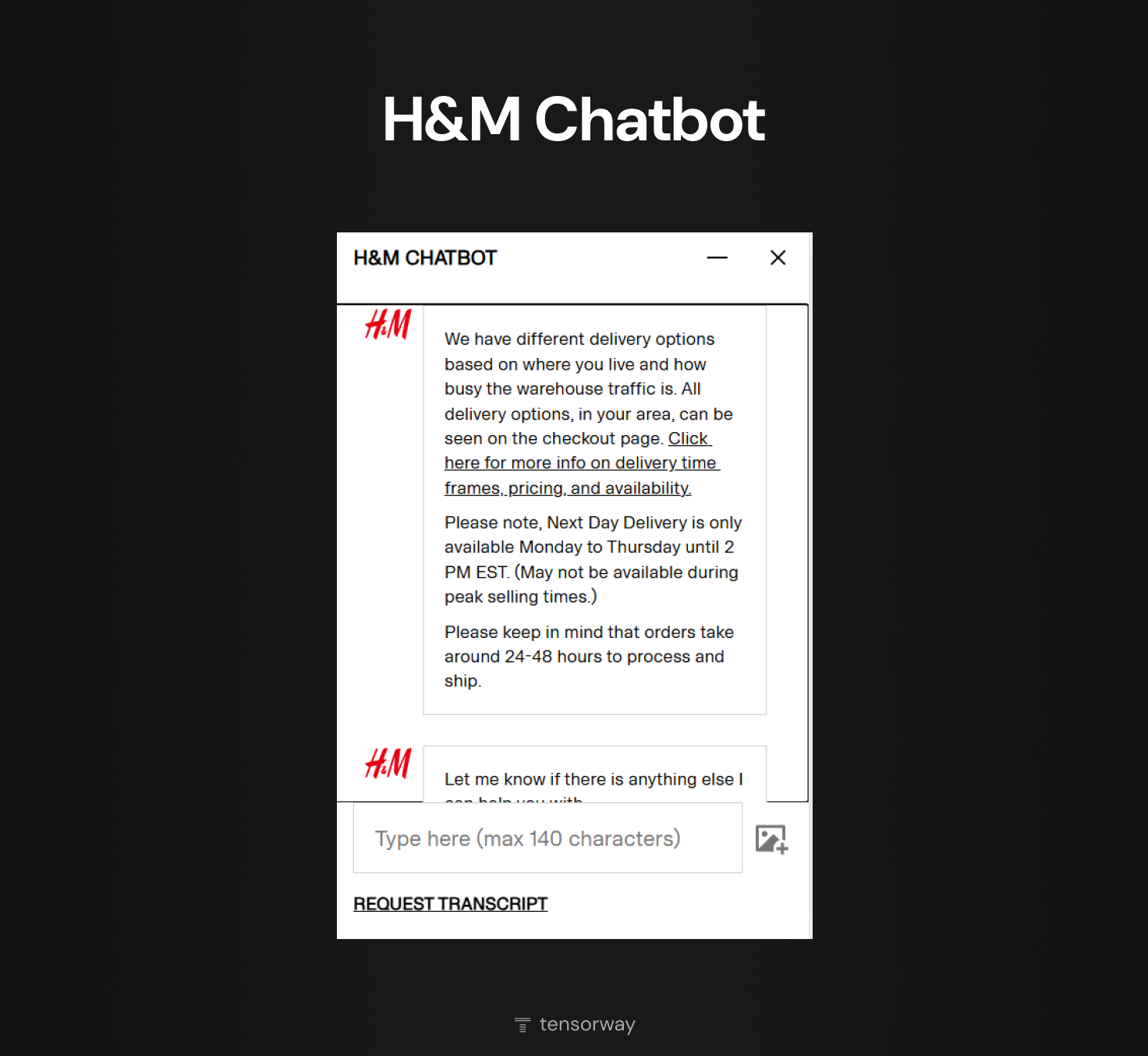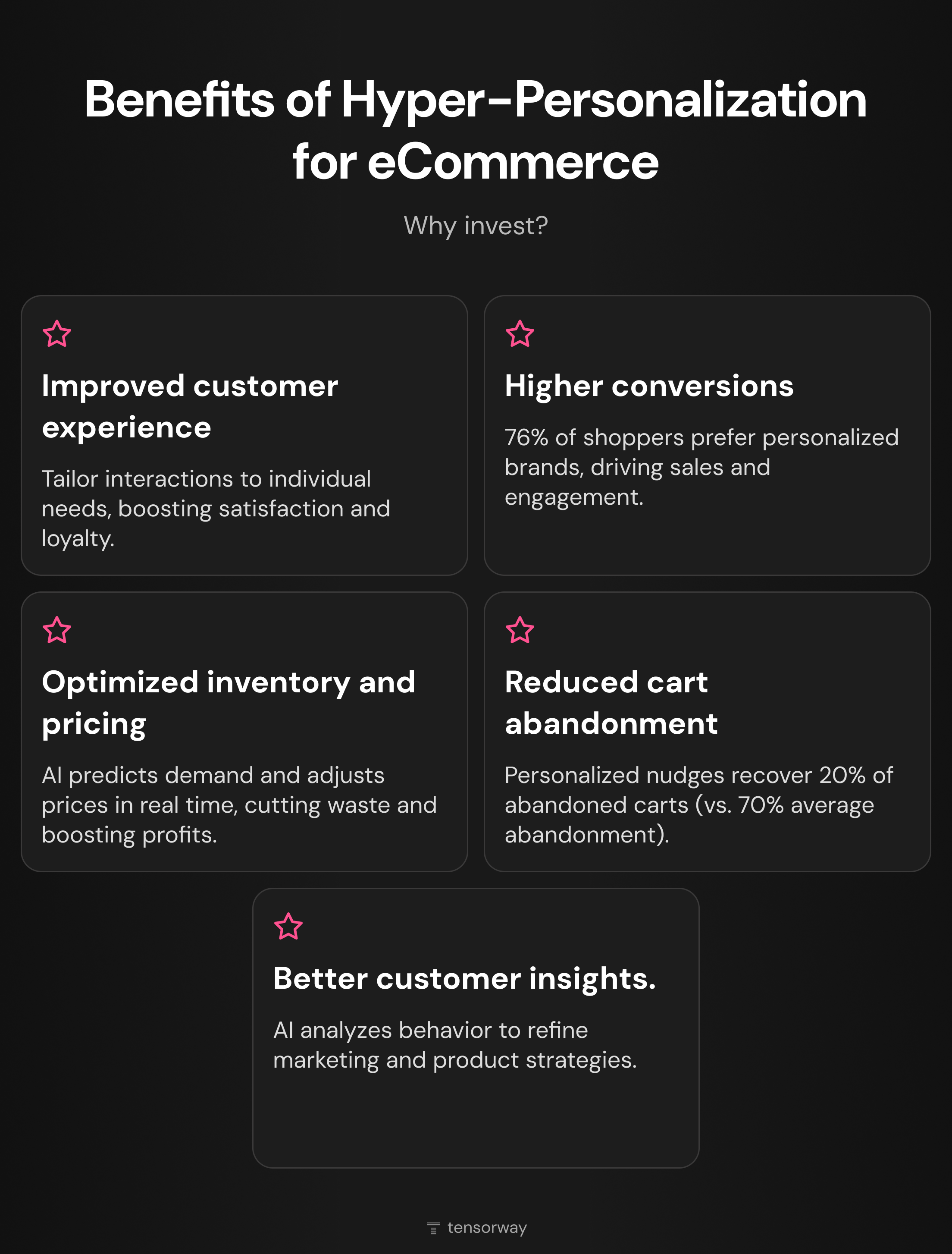Have you heard that around 71% of consumers expect to get personalized interactions with businesses? Moreover, 76% of respondents admitted that they get frustrated when they don’t have personalized experiences. Such figures brightly indicate that hyper-personalization, which is mainly related to the use of AI solutions, has already become a standard across various domains. eCommerce and retail are not exceptions here.
In this article, we are going to talk about the role of AI in hyper-personalization, as well as the advantages of this approach for both businesses and customers.
What Is Hyper-personalization?
Before we proceed to discuss advanced AI solutions, let’s focus on the basics.
Hyper-personalization can be defined as a specific approach to tailoring the shopping experience, using AI, machine learning, predictive analytics, and big data to deliver real-time, highly relevant interactions.
Traditional personalization strategies typically utilize basic demographic data. At the same time, hyper-personalization tactics are based on the analysis of real-time behavior, preferences, past purchases, browsing history, and even contextual factors. All this helps to create deeply customized experiences.
Today retail and eCommerce businesses increasingly rely on AI/ML tools to process vast amounts of customer behavior data and deliver personalized interactions.
Moreover, thanks to Generative AI, it has become much faster and easier to create individualized product suggestions, unique marketing content, and launch AI-driven shopping assistants.
Advanced AI Solutions in Shopping
AI business solutions can significantly change the way companies build their interaction with their customers. To better understand how this works, let's take a closer look at the real-world examples provided below.
AI-Driven Product Recommendations
AI models can efficiently analyze customer behavior, past purchases, and browsing history. Based on this data, such tools can suggest relevant products to users in real time, which can greatly drive sales.
Amazon is one of the eCommerce businesses that leverages the power of advanced AI solutions to provide personalized recommendations.
To make its recommended products look even more interesting to users, the company relies on a Large Language Model (LLM) to adjust product titles to what is the most important to customers. If you want to learn more about using AI for creating descriptions and images in eCommerce, please, follow this link.

Real-Time Behavioral Analysis
AI can work not only with historical data. This technology can also track and interpret user behavior across digital platforms in real time.
For instance, Shopify merchants can use different AI solutions to detect cart abandonment in real time. Depending on the chosen app and strategy, AI can send discount codes or reminders within minutes after a user leaves a cart.

Dynamic Pricing
With AI solutions company offering any products or services online can introduce dynamic pricing. What does it mean? In this case, artificial intelligence will analyze real-time data, including demand, competitor pricing, and customer behavior, and adjust prices to the ongoing conditions.
There are different dynamic pricing methods:
- Peak dynamic pricing. It presupposes that prices are set higher during a product’s peak seasons. This can help businesses greatly increase their profits.
- Segmented dynamic pricing. This method is based on geography. Businesses can earn more in the regions with higher-income customers.
- Inventory-driven dynamic pricing. Supply and demand can also have their impact on prices. Retailers and eCommerce shops usually charge less for items that they have in excess. Popular products can be sold at higher prices.
Such approaches are already implemented by many businesses, including Walmart and Amazon.
Chatbots & Virtual Shopping Assistants
It is rather expensive to maintain a huge support team that will be able to process dozens, if not hundreds, of inquiries at the same time in a 24/7 regime.
But a reliable AI assistant can fulfill this task. Virtual shopping assistants and chatbots are powered by Natural Language Processing (NLP) capabilities. As a result, they can provide customers with product recommendations and answer their numerous questions in no time.
Today a lot of shopping platforms have already launched their chatbots to enhance shopping experiences and let their customers easily get access to the latest order and delivery updates.

Personalized Emails & Offers
AI algorithms can analyze customer behavior and purchase history to prepare personalized promotions based on their interests.
Apart from this, advanced AI solutions allow businesses to automate the processes of crafting special offers related to personal occasions like birthdays.
Some flower delivery services go one step further. They can offer pleasant discounts and bonuses to their clients for the important dates of their friends and family members. Don’t you think that it can be quite convenient to get such a discount for your parents’ wedding anniversary or your sister’s birthday?
Virtual Try-Ons
The combination of such technologies as Augmented Reality (AR) and AI enables people to see how different products like makeup or clothes will look on them before buying. To do this, customers don't even need to visit a physical store. Everything can be done online.
One of the examples is Sephora Virtual Artist. The company’s mobile app lets users experience a virtual makeover, create personalized tutorials, and easily share their favorite options with friends. The app offers a rich collection of eyeshadows, lip colors, and false lashes to help users find their perfect match.

Personalized AI Voice Assistants
These advanced AI solutions can enhance the shopping experience by providing recommendations and managing shopping lists.
It’s worth mentioning that such tools are not just helpful when it comes to the convenience of a wide audience of users. They can also fully revolutionize shopping experiences for people with disabilities and significantly boost inclusivity in the eCommerce space.
Walmart has already launched such a service. Users can connect their mobile devices and home smart speakers to their Walmart accounts to make their orders without using their hands. They can just ask the system to add some products to their carts and it will do this for them. The system can also learn the preferred brands from previous purchases and choose the right options without extra instructions.
Predictive Inventory Management
Thanks to such systems, retailers have the right stock at the right time, minimizing waste and maximizing sales. It is possible thanks to the ability of AI to analyze demand patterns and make predictions based on numerous factors.
It is known that Zara relies on AI to get trend forecasting insights. This helps the company to quickly design and produce collections that its audience will like each season.
Benefits of Hyper-personalization for eCommerce and Retail Businesses
Let’s be honest, the introduction of custom AI solutions for personalization requires serious investments. But is it really worth allocating budgets for such projects? To make up your mind you need to have a look at the benefits that you can leverage with this technology.

- Improved customer experience. Hyper-personalization helps to demonstrate that the needs and preferences of each client matter. This ensures a seamless and enjoyable shopping journey for everyone.
- Higher conversions. 76% of consumers are more likely to buy something from brands that personalize communication with clients. It means that AI-driven personalization can significantly increase engagement and sales.
- Optimized inventory and pricing. AI helps retailers manage stock efficiently by predicting demand and setting competitive prices in real time.
- Reduced cart abandonment. Nearly 70% of online shopping carts are abandoned, which is a huge amount. Personalized reminders, retargeting emails, and AI-powered offers can encourage shoppers to complete their purchases. With the correctly chosen strategy, an abandoned cart recovery rate can be up to 20%, which will be a good indicator.
- Better customer insights. AI business solutions gather and analyze a lot of customer data that is highly valuable for building efficient marketing strategies.
AI Solutions for Hyper-personalization: Introduction Challenges
When it comes to the implementation of AI solutions for businesses, this process is always associated with some pitfalls. However, when you are properly informed beforehand, you can prepare for them and find a way to minimize their negative consequences.
Security and Data Privacy Concerns
The work of AI solutions is directly tied with the processing of huge volumes of data. To work properly such systems need to collect and analyze sensitive customer data. However, this can raise multiple concerns about the compliance with regulations like GDPR or CCPA.
What is recommended to do?
To make sure that all sensitive data is well protected, it is necessary to implement such measures as encryption and anonymization.
Integration into Legacy Infrastructure
The problem is that today many retailers still rely on outdated systems that were built more than 15 years ago. These systems were developed long before mass adoption and implementation of AI solutions for businesses. As a result, it may be too challenging to integrate legacy systems with modern AI and big data solutions.
What is recommended to do?
There can be different approaches to addressing this issue. One of them will be the modernization of existing systems. However, it can be a rather expensive and time-consuming project.
If you are not planning to introduce any serious changes to your legacy systems, at least you can try to choose AI business solutions that will be more appropriate for smooth integration with other systems. These can be cloud-based tools and tools with API-driven architectures.
Cost-related Challenges
The introduction of AI-powered hyper-personalization typically requires significant upfront investment in AI infrastructure, data analytics, and skilled personnel.
What is recommended to do?
It could be sensible to start with smaller AI pilots and introduce such solutions gradually when the feasibility of the previous stages is already clear. In some cases, it could be a good idea to begin your AI journey with third-party platforms before building custom AI solutions from scratch.
Bias and Accuracy Issues
AI models rely on vast datasets to make personalized recommendations. However, if these datasets are incomplete or biased, the AI may produce inaccurate or unfair results.
Such a situation can result in unreliable recommendations, loss of customer trust, as well as legal and ethical risks. Such risks are especially serious when it comes to discriminatory pricing or exclusionary practices.
What is recommended to do?
To address this issue, it is recommended to ensure diverse and representative data, regularly audit training data to identify and correct imbalances, as well as implement bias-detection mechanisms.
It is also helpful to utilize transparent AI models that can provide insights into how specific recommendations are made. Moreover, do not underestimate the value of feedback. Businesses should allow customers to give feedback on recommendations. This can help refine AI accuracy.
Final Thoughts
Hyper-personalization is transforming the shopping experience. Such tools can deliver tailored recommendations, dynamic pricing, and seamless customer interactions.
With AI solutions company can not only achieve higher customer satisfaction but also greatly boost conversions and drive business growth. Namely, thanks to these advantages, hyper-personalization is likely to become an essential strategy for the future of eCommerce.
If you are thinking about the implementation of such tools into your business processes, you need to have seasoned experts by your side. At Tensorway, we are always ready to provide you with professional development and consulting services. Just contact us and share your ideas.
FAQ
How much does it cost to build an AI solution for shopping hyper-personalization?
The price of your custom product development will depend on many factors, including the complexity of your future solutions and the size of the hired team. On average the cost of such projects varies from $50K to $150K. To get more precise information, you need to contact your development team.
Who can develop custom AI business solutions tailored to my needs?
If you are not planning to hire in-house experts, it would be sensible to establish cooperation with a professional AI development agency with relevant experience. At Tensorway, we are always open to new projects and will be happy to assist you in the AI implementation journey.
Are there any risks in implementing AI-driven hyper-personalization tools?
Over-personalization can bring negative results. Customers may feel overly monitored, which may result in potential backlash, reduced engagement, and even brand reputation damage.



